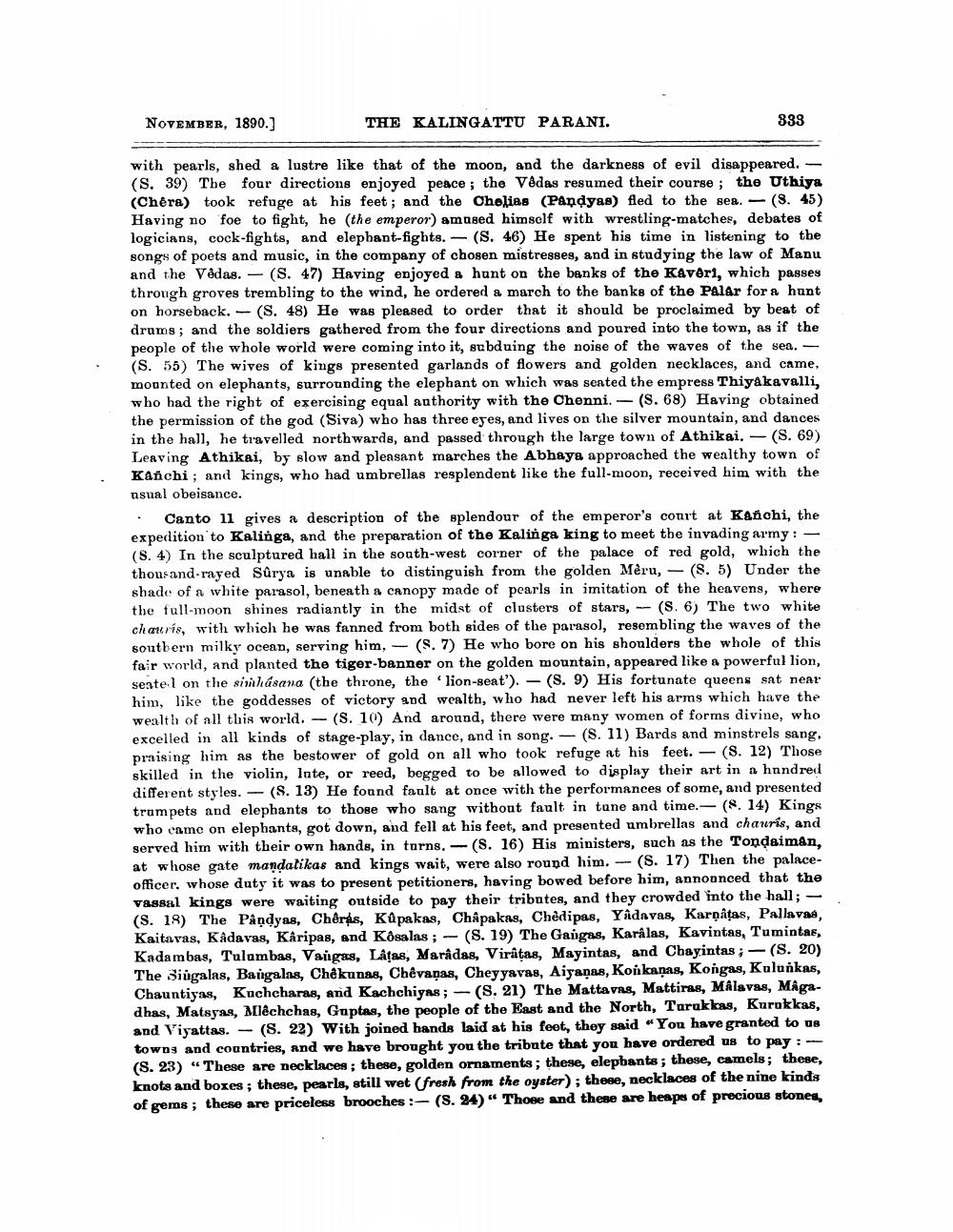________________
NOVEMBER, 1890.]
THE KALINGATTU PARANI.
833
with pearls, shed a lustre like that of the moon, and the darkness of evil disappeared. - (S. 39) The four directions enjoyed peace; the Vedas resumed their course; the Uthiya (Chera) took refuge at his feet; and the Cholias (Pandyas) fled to the sea. (3.45) Having no foe to fight, he (the emperor) amased himself with wrestling-matches, debates of logicians, cock-fights, and elephant-fights. (S. 46) He spent his time in listening to the songs of poets and music, in the company of chosen mistresses, and in studying the law of Manu and the Vedas. - (S. 47) Having enjoyed a hunt on the banks of the Kavori, which passes through groves trembling to the wind, he ordered a march to the banks of the Palar for a hunt on horseback. (S. 48) He was pleased to order that it should be proclaimed by beat of drams; and the soldiers gathered from the four directions and poured into the town, as if the people of the whole world were coming into it, subduing the noise of the waves of the sea. - (S.55) The wives of kings presented garlands of flowers and golden necklaces, and came, mounted on elephants, surrounding the elephant on which was seated the empress Thiyakavalli, who had the right of exercising equal authority with the Chenni. — (S. 68) Having obtained the permission of the god (Siva) who has three eyes, and lives on the silver mountain, and dances in the hall, he travelled northwards, and passed through the large town of Athikai. (S. 69) Leaving Athikai, by slow and pleasant marches the Abhaya approached the wealthy town of Kanchi; and kings, who had umbrellas resplendent like the full-moon, received him with the asual obeisance.
• Canto il gives a description of the splendour of the emperor's court at Kanchi, the expedition to Kalinga, and the preparation of the Kalinga king to meet the invading army: - (S. 4) In the sculptured hall in the south-west corner of the palace of red gold, which the thousand-rayed Surya is unable to distinguish from the golden Meru, - (8.5) Under the shade of a white parasol, beneath a canopy made of pearls in imitation of the heavens, where the full-moon shines radiantly in the midst of clusters of stars, -- (S. 6) The two white chaurís, with which he was fanned from both sides of the parasol, resembling the waves of the southern milky ocean, serving him,- (s. 7) He who bore on his shoulders the whole of this fair world, and planted the tiger-banner on the golden mountain, appeared like a powerful lion, seatel on the sirihásana (the throne, the lion-seat'). - (S. 9) His fortunate queens sat near him, like the goddesses of victory and wealth, who had never left his arms which have the wealth of all this world. - (S. 10) And around, there were many women of forms divine, who excelled in all kinds of stage-play, in dance, and in song. - (S. 11) Bards and minstrels sang, praising him as the bestower of gold on all who took refuge at his feet. (8. 12) Those skilled in the violin, lute, or reed, begged to be allowed to display their art in a hundred different styles. - (S. 13) He found fault at once with the performances of some, and presented trampets and elephants to those who sang without fault in tune and time.- (8.14) Kings who came on elephants, got down, and fell at his feet, and presented umbrellas and chauris, and served him with their own hands, in turns. - (S. 16) His ministers, such as the Tondaiman, at whose gate mandalikas and kings wait, were also round him. - (S. 17) Then the palaceofficer, whose duty it was to present petitioners, having bowed before him, announced that the Vassal kings were waiting outside to pay their tributes, and they crowded into the hall; - (S. 18) The Pandyas, Chêras, Kapakas, Chåpakas, Chodipas, Yadavas, Karpatas, Pallavas, Kaitavas, Kidavas, Kåripas, and Kosalas; - (S. 19) The Gangas, Karalas, Kavintas, Tumintas, Kadambas, Tulumbas, Vaigas, Laļas, Marâdas, Viratas, Mayintas, and Chayintas; - (S. 20) The Siugalas, Bangalas, Chekunas, Chêvapas, Cheyyavas, Aiyaņas, Konkaņas, Kongas, Kulunkas, Chauntiyas, Kuchcharas, and Kachchiyas; - (S. 21) The Matta vas, Mattiras, MÁlavas, Magadhas, Matsyas, allêchchas, Guptas, the people of the East and the North, Tarukkas, Kurukkas, and Viyattas. - (8. 22) With joined hands laid at his feet, they said "You have granted to us towns and countries, and we have brought you the tribute that you have ordered us to pay :(S. 23) “These are necklaces; these, golden ornaments; these, elephants; these, camels; these, knots and boxes; these, pearls, still wet (fresh from the oyster); these, necklaces of the nine kinds of gems; these are priceless brooches :- (S. 24) “ Those and these are heaps of precious stones,




